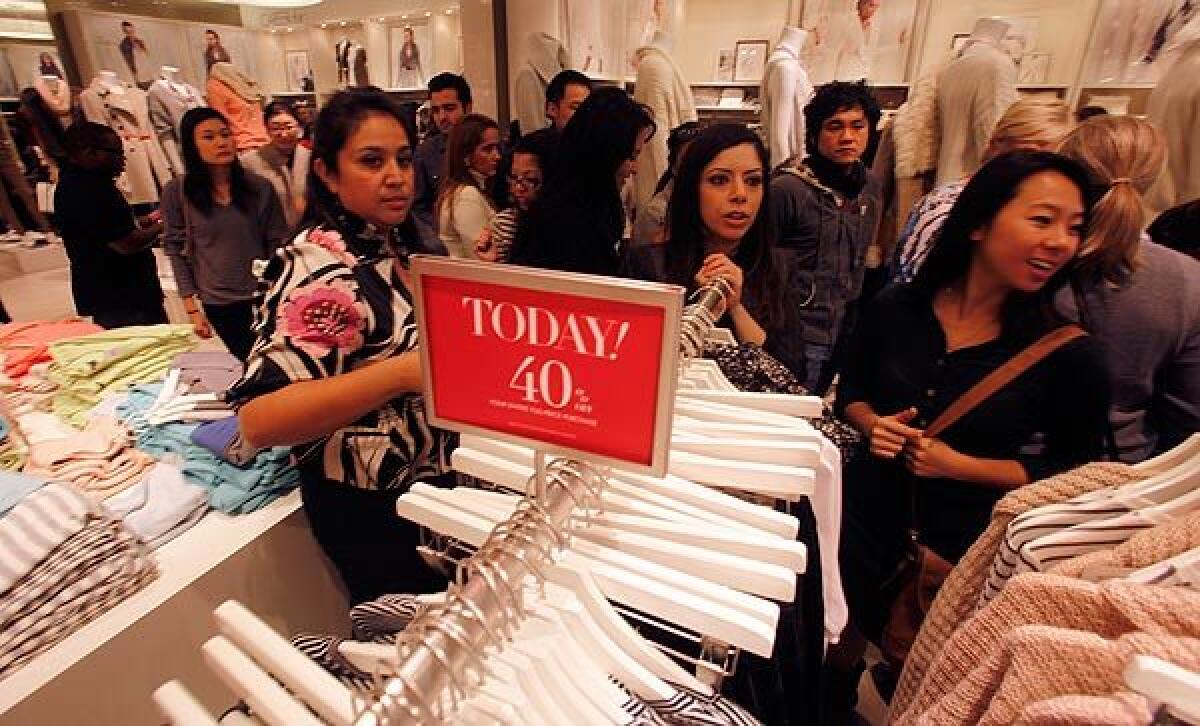Newsletter: Hate lousy service? You’re not alone (not that this changes anything)

- Share via
I’m Business columnist David Lazarus, with a look today at customer service.
What do consumers want? According to a report last week from Oracle Retail, a division of Bay Area software giant Oracle, consumers want to feel wanted.
“Consumer expectations are perpetually in flux, with each positive experience setting a new bar for success in retail,” said Mike Webster, senior vice president and general manager of Oracle Retail.
“No matter if they’re enjoying the convenience of ride sharing, browsing through a seamless in-app experience, or walking into a brick-and-mortar storefront, customers expect the same caliber of service in all interactions, upping the stakes for retailers as they compete with rival brands and new business models,” he said.
In effect, what this report is saying is that customer service matters.
The fact that this even has to be said is a sad reflection of how far off a cliff service has fallen, with many companies sacrificing customer relationships for fatter profit margins (and happier shareholders). Don’t even get me started on the evil of automated switchboards.
Oracle Retail says a core problem is that consumers and retailers can’t even agree on what’s happening. For example, it found that 57% of 210 retailers surveyed said returning products is “very easy.”
But roughly the same percentage of consumers called the return process a “complete hassle.”
Similarly, 22% of consumers say expert advice from store workers is a crucial part of a satisfactory shopping experience. Only 6% of retailers said they viewed this as important.
If there’s a single sentiment I’ve heard from consumers over the years, it’s that good service will keep them loyal, and bad service will prompt an immediate search for alternatives.
Yet we live in an age when nearly all businesses are embracing automation as a money-saver, and the old adage about the customer always being right no longer applies.
These days, the customer is expected to accept any level of service offered, even if that means long lines at the one cash register open, or salespeople not knowing their own product line.
The takeaway for me from Oracle Retail’s report is that for all the whiz-bang technology available to retailers and other businesses, it’s the human touch that matters most. Show customers that you value their business, and that you want their business in the future.
Just 1 in 5 younger shoppers — millennials, Generation Z — trust what retailers tell them, Oracle Retail found. That means the vast majority do not.
If I ran a business, and I cared about that business’ future, stats like those would scare the bejeepers out of me.
What do consumers want? Respect. As has always been the case.
Now then, here are some recent stories that caught my eye:
STORY LINES:
Bodies of evidence: A rising number of death investigations across the country were complicated or upended after transplantable body parts were extracted prior to a coroner’s autopsy, a Times investigation reveals.
Top of the market: The most expensive house listed for sale in the United States is Casa Encantada, on the market for $225 million. The 40,000-square-foot Bel Air estate owned by financier Gary Winnick is up for sale at a time when the high-end market has been trending downward, thanks to a glut of Westside mansions built on spec.
Avoiding eviction: In a bid to prevent landlords from evicting tenants before new state rental rules come into effect in January, the Los Angeles city attorney is drafting an emergency ordinance to halt evictions without sufficient cause, such as failure to pay rent.
Without care: Residential care homes for the disabled in Orange County paid workers as little as $4 an hour and made them work more than 87 hours a week, according to a federal lawsuit. The owners of the homes paid $1.1 million in back wages and pay for 66 workers after falsifying records and intimidating employees.
WHAT WE’RE READING:
Here’s a toast: Millennials did not kill the dinner party, Vox reports, they are just too broke to own fine china. The social tradition has become more casual and less a display of wealth and sophistication.
Sneaky dealings: There’s a battle underway in the sneaker industry over stolen designs, according to Fast Company. The current spat involving Nike and Sketchers is a microcosm for the bigger debate about fast fashion and intellectual property.
Let me know what you think of the newsletter. My email is david.lazarus@latimes.com, or you can find me on Twitter @Davidlaz. Also, tell all your social media pals to join the party.
Until next time, see you in the Business section.
More to Read
Inside the business of entertainment
The Wide Shot brings you news, analysis and insights on everything from streaming wars to production — and what it all means for the future.
You may occasionally receive promotional content from the Los Angeles Times.











